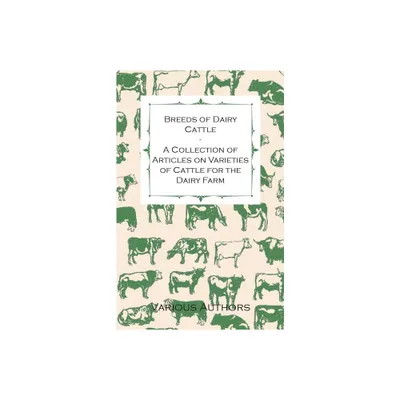Home
Instant Insights: Dietary supplements in dairy cattle nutrition
Loading Inventory...
Barnes and Noble
Instant Insights: Dietary supplements in dairy cattle nutrition
Current price: $49.99


Barnes and Noble
Instant Insights: Dietary supplements in dairy cattle nutrition
Current price: $49.99
Loading Inventory...
Size: OS
*Product Information may vary - to confirm product availability, pricing, and additional information please contact Barnes and Noble
This collection features five peer-reviewed reviews on dietary supplements in dairy cattle nutrition.
The first chapter addresses the manipulation of rumen fermentation to maximise the efficiency of feed utilisation and increase ruminant productivity. It considers a wide variety of approaches, including the use of dietary buffers.
The second chapter reviews the use of probiotics as supplements for ruminants to promote digestive efficiency and productivity. The chapter summarises the benefits and modes of action of probiotics, as well as their role in optimising feed efficiency and reducing methane production.
The third chapter considers the beneficial roles of plant secondary compounds in sustainable ruminant nutrition. It describes the effects and composition of the three major groups of plant secondary compounds: essential oils, tannins and saponins.
The fourth chapter discusses the growing need for alternative feed sources as a result of increasing demand for meat and dairy products. The chapter reviews the nutritional composition of seaweed and introduces it as a potential novel protein supplement in animal feeds.
The final chapter evaluates the role of macroalgae as a potential anti-methanogenic ruminant feed resource and reviews its impact on animal production and performance.
The first chapter addresses the manipulation of rumen fermentation to maximise the efficiency of feed utilisation and increase ruminant productivity. It considers a wide variety of approaches, including the use of dietary buffers.
The second chapter reviews the use of probiotics as supplements for ruminants to promote digestive efficiency and productivity. The chapter summarises the benefits and modes of action of probiotics, as well as their role in optimising feed efficiency and reducing methane production.
The third chapter considers the beneficial roles of plant secondary compounds in sustainable ruminant nutrition. It describes the effects and composition of the three major groups of plant secondary compounds: essential oils, tannins and saponins.
The fourth chapter discusses the growing need for alternative feed sources as a result of increasing demand for meat and dairy products. The chapter reviews the nutritional composition of seaweed and introduces it as a potential novel protein supplement in animal feeds.
The final chapter evaluates the role of macroalgae as a potential anti-methanogenic ruminant feed resource and reviews its impact on animal production and performance.


















